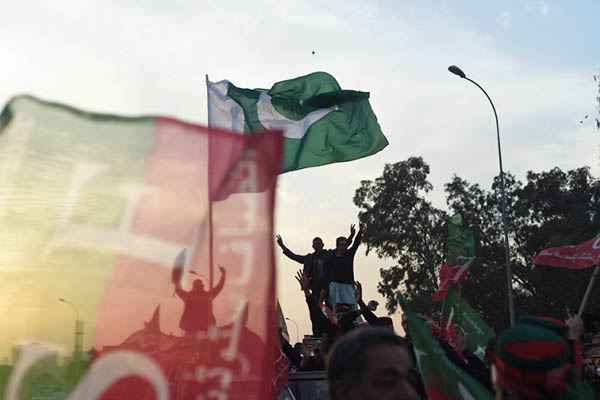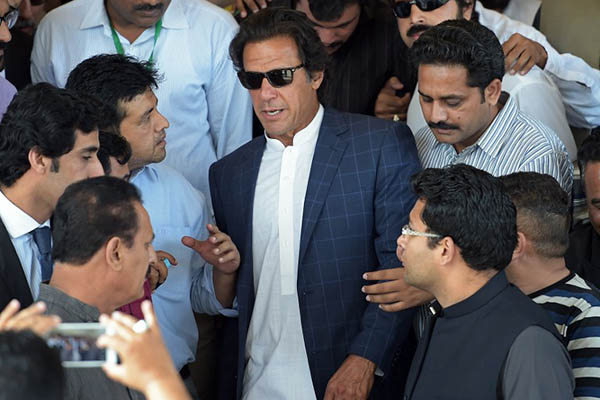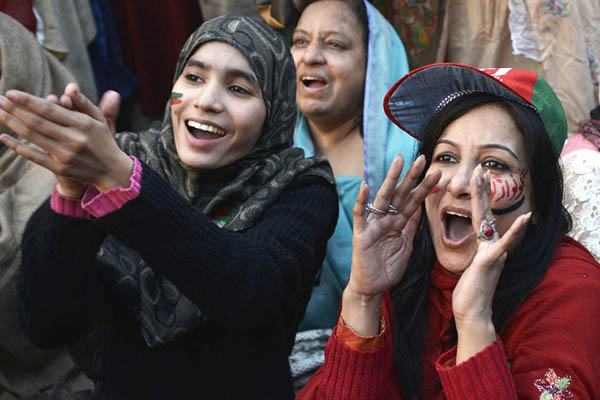
Farooq Naeem—AFP
Residents of Khyber-Pakhtunkhwa criticize the PTI’s failure to deliver on its campaign vows two years after coming into power.
The Pakistan Tehreek-e-Insaf, led by Imran Khan, emerged as the majority party in Khyber-Pakhtunkhwa province during the 2013 general elections, raising the hopes of residents frustrated by the corruption and apathy of previous governments. But in the two years since the party formed a coalition government with the Jamaat-e-Islami, its supporters have been left wondering what became of the change they were promised.
“Other than a few new faces in the cabinet, we’ve seen no difference in our governance,” says Mukhtiar Ali, a resident of Peshawar who was swindled out of hundreds of thousands of rupees for a passport that proved to be fraudulent. When Ali attempted to report the crime to police, he was met with indifference. “I have knocked on every door I could—I even approached the Chief Minister’s Complaint Cell—but have been repeatedly rebuffed,” says Ali. “I voted for the PTI and now I feel I wasted my time because this government has no one to help the poor either.”
According to the Khyber-Pakhtunkhwa government, the complaint cell has received thousands of complaints since it was set up, and boasts a “substantial” clearance rate. However, it notes that most complaints are inactionable as they have “insufficient information.” The organization’s website—a stark affair—urges complainants to provide “definite and specific information and evidence regarding corruption,” without detailing what it specifically requires to proceed.
But the complaints don’t stop there. Political observers in Khyber-Pakhtunkhwa say the PTI is quickly losing support in the province due to poor governance, undelivered promises and rampant nepotism that threatens to violate the promises that led to Imran Khan’s victory in the last general elections.
Governance Matters
Mohammad Riaz, a senior journalist and ex-president of the Peshawar Press Club, says bad governance—or at least the perception of it—is the PTI’s primary problem. “Imran Khan’s party has failed to implement the changes promised during his election campaign,” he says. “Instead of criticizing his opponents, he should prove his own party’s worth in Khyber-Pakhtunkhwa. [For the people] every act of the provincial government impacts his personal credibility,” he added.
“Politics in Khyber-Pakhtunkhwa have always revolved around slogans. The people of this region are emotional and give their trust freely. But, conversely, they also lose faith quickly too,” says Riaz. “In 2002, the religious alliance Muttahida Majlis-e-Amal (MMA) swept the elections by playing on anti-American sentiment. Da America Jang Na Manu (We Don’t Accept the U.S. War) was a popular slogan at the time, as people were angry over the war in Afghanistan,” he says. “The MMA was thrown out when people realized they weren’t interested in addressing their concerns.”
Similarly, says Riaz, the ANP’s rise to power came on the heels of them promising peace in the region. “But once people realized the extent of their corruption, they rejected them in the 2013 general elections.” For someone like Khan, who won on the promise of “change”, the risks are especially high.
“People were fed up of the old system that failed to address their problems… they were tired of the suicide bombings that almost destroyed local businesses,” he says, adding that Khan stoked anti-U.S. sentiments by protesting against drone strikes and promised residents of the province a corruption-free government. “[Once the PTI was elected] it was a golden chance for Imran Khan to win peoples’ hearts by fulfilling his election campaign promises, such as turning Governor’s House and the Chief Minister’s House into a women’s university and public park, respectively, and to hold local bodies elections within 60 days. But it never happened. [It’s obvious] Khan realized that fulfilling those promises would go against his cabinet, including Chief Minister Pervez Khattak,” he added.
Riaz admits as valid Khan’s justification that Governor’s House falls under the purview of the federal government and cannot be used by the provincial government. However, he questions the reasoning behind allotting three official residences to C.M. Khattak, as revealed in parliamentary proceedings, and the failure to convert the primary residence to a park.
Austerity Lost
The PTI, in its election manifesto, had claimed to supporters that Khattak would stay at his own house to promote austerity. Parliament records indicate otherwise. Opposition lawmakers have also demanded the government explain the money being spent on the renovation of houses allotted to the chief minister, ministers and officers, claiming the expenditure violates austerity promises. The PTI has justified the expenses by claiming the expenditure is merely “maintenance costs” and that Khattak is not utilizing the official residence. This isn’t enough for detractors.
Tariq Afaq, general secretary of the Khyber Union of Journalists, claims the PTI often tries to deflect criticism through promises of much-trumpeted legislation that never comes to pass. The Khyber-Pakhtunkhwa Prevention of Conflict of Interest Act, 2014 is one piece of legislation that has been pending for two years. “There are serious allegations about the C.M. backing his son-in-law for by-elections and retaining the Housing and Works Department for himself, as he is a contractor. How can we expect this government to implement laws like this?” Khattak’s son-in-law Adnan Khan was initially tapped for the Senate before he withdrew his nomination papers. He also contested the by-elections for Bannu’s PK-70 constituency, but lost to the JUI-F.
Dr. A.Z. Hilali, chairman of the political science department at Peshawar University, is another Khattak critic. “The PTI’s top leadership appears to have made several compromises on its principled stands, which is denting its popularity in the province,” he said, noting Khattak was notorious for his ever-changing loyalties. “Their first compromise was their choice of chief minister. Pervez Khattak was a nazim during the Musharraf era and a minister under the ANP and is now with the PTI.” Riaz says Khan’s failure to bring new faces to the fore shows he doesn’t have full control of his own party. “I know some people within his party didn’t let him fulfill his promise, which proves he is losing strength within it,” says Riaz. “People are beginning to question whether they have been betrayed again.”

Aamir Qureshi—AFP
Future Fight
Afaq also wonders why Khan does not oust the bad seeds in his organization. “One of his MNAs [Murad Saeed] broke the rules of the University of Peshawar but Khan said nothing to him,” he added. Saeed is alleged to have used his political influence to subvert the rules of the University of Peshawar by appearing in three exams in one hour. He has denied any wrongdoing.
In recent weeks, PTI has faced similar criticism from within the party as well. Former Supreme Court judge Wajihuddin Ahmed has alleged in media interviews that “a gang of four”—Pervez Khattak, Jahangir Tareen, Aleem Khan, and Nadir Akmal Laghari—are controlling the party and making it deviate from its manifesto. He was recently suspended from the PTI for discussing the party’s internal affairs with media. Aleem Khan, meanwhile, was granted a party ticket to contest by-polls in NA-122, where Imran Khan lost to the PMLN’s Ayaz Sadiq in the 2013 general elections.
The party’s future is a sore point among its supporters. Journalist Riaz says the middle class in Khyber-Pakhtunkhwa is especially worried. “Segments of the educated middle class, which came out for the first time to support Imran Khan, have started wondering whether the decision they took in the 2013 polls was right or wrong. There are also concerns about Khan’s statements in favor of the Taliban, as many people have lost friends or families in the bombings claimed by the militants.” Riaz specifically cited Chief Minister Khattak’s 2013 statement on treating Taliban like ‘brothers’. “Advocating talks when our security forces were fighting against them makes the writ of the government look very weak,” he said.
University professor Hilali says that while Khan should be praised for mobilizing disenfranchised youth, he needs to consider the fallout if the PTI fails to meet their expectations. “If Imran Khan doesn’t ensure his government delivers on its promises, I’m afraid we will lose our future since our youth will just become desperate and pessimistic. We have already examples of youth in the tribal belt joining extremists over the state’s failure to secure their future. Khan has a large following among the young, but they can easily turn on him.”
Personal Gains
Afaq, the general secretary of KUJ, claims Khan’s failure to end VIP culture—a central tenet of the party’s manifesto—had betrayed the masses. “Khan always accuses others [politicians] of using government assets for personal use, but he seems to have no issues with using the Khyber-Pakhtunkhwa government’s helicopter. If he is merely the party chief, then what qualifies him to use it?” He said Khan had also visited the Army Public School with full protocol. “When the media asks him about this, he criticizes them. Does he think we’re fools?”
Journalist Aqeel Yousafzai says Khan’s campaign promised that his government would never use public funds to promote individuals. “Why are there billboards and hoardings with pictures of Khan and the C.M. trumpeting their development budget?”

Arif Ali—AFP
Invisible Women
Journalist Riaz says Khan’s claims of gender equality also ring hollow. “His party doesn’t even have any female ministers in the cabinet… how can he claim to address inequality?” Dr. Hilali agrees. “The party claims its women supporters exceed the men. Yet it appears to have no space for women on key posts. Doesn’t this imply the PTI has no trust in women?” he questioned.
The party maintains that it is fighting for women to reclaim political space, but its failure to deliver on these promises reflects its overall complacency, says Afaq. “The PTI-led provincial government has yet to announce any mega-projects and it couldn’t even utilize its entire development budget last year despite desperate need for infrastructure in Khyber-Pakhtunkhwa,” he said. Local sources blame delays in decision-making and flawed rules and regulations for the poor utilization of funds. But these same rules were implemented by the PTI.
Development Down
Hilali claims PTI’s performance problem is not restricted to Peshawar alone. “The provincial government has allowed its development budget to go largely unused in the past two years. It has no mega projects under consideration and it doesn’t seem to know what to do with the finances it has,” he added. “They [PTI] can’t blame the opposition or the federal government for failing to utilize these funds. This is purely an administrative failure.”
Afaq says the lack of infrastructure development is a growing concern. “During his campaign, Imran Khan claimed his government would construct over 300 dams in Khyber-Pakhtunkhwa. Where are these? There is about Rs. 4 billion allocated for the energy sector in the annual budget, which is next to nothing. This government cannot even fulfill its own budget requirement and keeps relying on donor agencies and the federal government.” He advised the government to spend more money on developing the local economy instead of relying on outside sources.
Journalist Yousafzai also questioned the PTI’s decision to inaugurate new flyovers in Peshawar. “A few months ago, Imran Khan told his supporters that the PMLN was wasting money and creating environmental problems by constructing flyovers and roads. Why is his government pursuing the same strategy then?” Last year, the provincial government announced a new 26km highway and a metro bus service along the lines of initiatives already introduced by the rival PMLN in Punjab province. Yousafzai also claimed the PTI had not bothered to improve existing infrastructure and had yet to improve basic services such as trash collection.
“The PTI just passed a provincial budget in excess of Rs. 480 billion, but the government generates a revenue of Rs. 55 billion. Where will the rest of the money come from?” questioned Afaq. They don’t even discuss the deficit, he says, noting that authorities have claimed the budget is ‘balanced’. “Will they announce a supplementary budget if they can’t generate all those funds?”
Educated Mistakes
The PTI’s failure to implement its plans for the education and health sectors of Khyber-Pakhtunkhwa is also problematic, say observers. “Khan claimed education and health would be the main priorities of his government, but the past two years have not revealed any substantial changes to either policy,” says teacher Hilali.
Last year, acting on pressure from its coalition partner, the PTI agreed to revise the curriculum for provincial government schools, including excising images of girls with their heads uncovered and adding Quranic verses to science books. Observers have declared the move a rollback on secular teachings. Hilali says it is obvious that neither Imran Khan, nor Pervez Khattak have any knowledge of the education sector.
“Khan had claimed that he would introduce an identical curriculum for government and private institutions—this is a difficult, if not downright impossible undertaking,” says Hilali, “how can you even think about introducing Oxford textbooks in government schools when many of the teachers don’t even know how to speak English? Conversely, why should private school students be expected to study everything in both Urdu and English?”
Afaq, meanwhile, says the PTI’s much-vaunted ‘Ghar Aya Ustaad’ scheme to increase school enrolment is a sham. Under the initiative, teachers visit local families and convince them to send their children to school. “The minister of education says the government is providing free education and that is enough. It is not. If a poor man is relying on his children to help support him, he will never opt for schooling,” says Afaq.
Flawed Polls
Veteran journalist Afaq praised the PTI’s decision to conduct local body elections, but alleged they were “massively” rigged. “In my 20 years as a journalist, I have never witnessed such mismanaged polling. What became of Imran Khan’s promises to hold free and fair elections, regardless of whether his party wins or loses?”
He also wondered why the party should be trusted to run the entire country, when it had so much trouble with a single province. “Even Khan himself admits his government could not conduct the local body polls properly. In a speech in Multan he claimed ‘We were inexperienced and couldn’t organize such a huge election.’ Then why should we trust [his government] to conduct general elections in Pakistan?” The same problems can be witnessed throughout Khyber-Pakhtunkhwa, he said, adding the PTI-led government’s lack of experience was hampering it.
“Depoliticizing police was a great initiative that must be appreciated but it was obviously flawed. During the local body elections, we saw that police could not deliver,” says Yousafzai, reiterating allegations of rigging.
Missed Opportunities
Professor Hilali says Khan should have fulfilled his promise to build at least one cricket stadium in every district of Khyber-Pakhtunkhwa. “Imran Khan is a sports icon and people in the province expected him to help the region’s youth find some outlets through sports. But we have seen nothing.” The senior educator said even a new stadium in Peshawar would have gone a long way toward convincing people that the PTI was living up to its promises.
Aasia Bibi, an elderly woman who voted for the PTI during the 2013 polls, said she had been dejected by the new government’s apathy. “There is no difference between this government and the last one,” she said. “Poor and needy people still get no mercy from government officials. This is not what we had expected from Imran Khan or his party.”
Past Lessons
“People are slowly realizing that what Imran Khan says and what he does are two different things. You will see history repeat itself in the next general elections,” predicted Riaz. Afaq also said history would be repeated if the provincial government did not show substantial improvement—and soon. “This is the time for Imran Khan to set an example for the rest of the country. We all know that in the past 20 years, no party was ever given a second chance in Khyber-Pakhtunkhwa.” Yousafzai agreed. “The way things have been progressing the last two years makes me believe that Imran Khan is only capable of making promises, not delivering on them.”

2 comments
Clearly anti PTI article.
Let me verify it.
1. NADRA issues passport which is federal subject , author showed his lifafa here.
2. If LBE elections were rigged why PTI formed govt. in only 9/24 districts. And why on re-poll they managed 45% votes as compared to initial poll. By the way Khan had called for re-poll, which all parties didn’t accept.
In the end I don’t have time to answer many lifafa-sights in article. The province where whole of the bureaucracy is corrupt to the core, how can one gave exceptional governance. Things are improving and will take upsurge in next 12 months with the implementation of LBE, in which power is transferred to ground.
Thanks
What a bullsh*t article is this.. wondering if Newsweek has “Journalists” on payroll….Biased and sorry for Newsweek